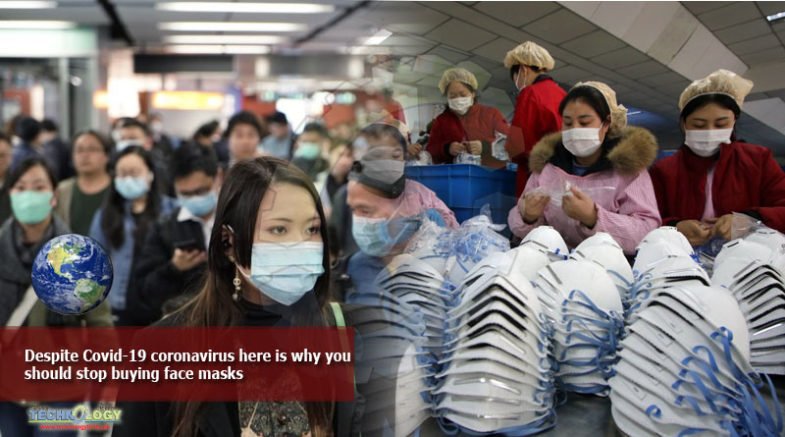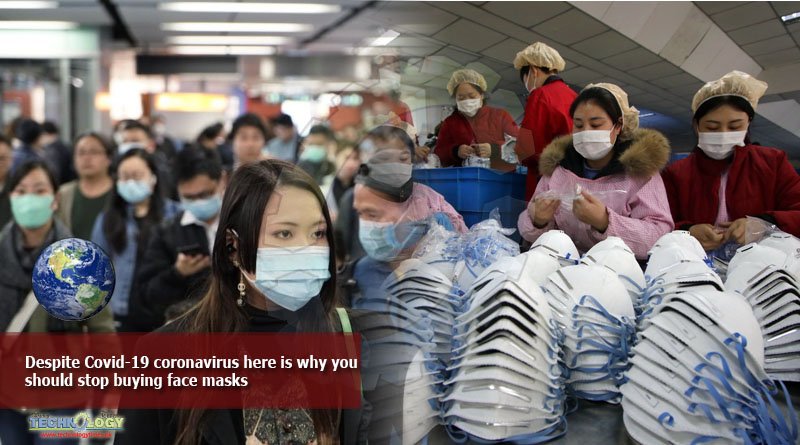Put down the mask, and step away.

Unless you are health care professional, a hockey goalie, or Batman, or caring for someone who has an infection like a new coronavirus infection, you probably do not need to buy a mask, just because of the COVID-19 coronavirus (SARS-CoV2) outbreak. And if you are Batman or a hockey goalie, a N95 respirator mask isn’t going to help you keep pucks from your face or The Joker from your identity.
The SARS-CoV2 outbreak has been good for face mask manufacturers and sellers. According to Dee-Ann Durbin, Anne D’Innocenzio, and Joseph Pisani writing for the Associate Press, face mask sales have been surging around the world. Demand has been so high that many businesses have sold out of such items or are limiting the number that customers can buy. Yes, in this way, face masks have become like Baby Yoda toys, except less cute.
Don’t expect mask sellers to tell you any time soon that you don’t need masks. After all, how many businesses will ever say, “you don’t really need my product, don’t buy my product, don’t give me money, and screw the shareholders”? Quite the contrary. As Megan Cerullo indicated for CBS News, some mask sellers have used this as an opportunity to raise the prices of masks. Isn’t that wonderful?
Keep in mind that buying most face masks out there can be like purchasing a scented trash bag: a huge waste of money. Many available masks are going to do diddly squat for you. By the way, “diddly squat” is a technical term for “nothing” or “nadda.” If a mask is not tested and approved as a legitimate N95 respirator by the National Institute for Occupational Safety and Health (NIOSH), it’s not going to do much to stop the new coronavirus from reaching your mouth or nose.
Moreover, the Centers for Disease Control and Prevention (CDC) has maintained that you should only wear a mask if you yourself are infected with the new coronavirus or if you are taking care of someone who may be infected. Otherwise, you are just depleting supplies for those people who may actually need such masks such as health care professionals. The current mask-buying frenzy has even prompted U.S. Surgeon General Jerome Adams, MD, MPH, to tweet the following this morning:
You know it’s serious when the Surgeon General has to say “seriously people.” Indeed, the current mask-sales frenzy is exactly that: a frenzy.
That means don’t get swayed by selfies like the following one on Instagram from film star Kate Hudson:
Yeah, a standard surgical mask like the one that she is wearing ain’t going to keep much out except maybe keeping people from recognizing that she is Kate Hudson. Such masks are quite hole-ly, having many, many small holes. And viruses are small enough to get through these holes.
At most, such a mask may make it harder for you to touch your nose and mouth, a common way of infecting yourself with viruses, as I described previously for Forbes. Thus, from a “protecting you” standpoint, wearing a surgical mask would have about the same effect as covering your face with pastrami, except without the obvious advantages of pastrami.
In fact, doctors, nurses, and other health professionals typically wear such masks to protect you from them. Such masks can make it harder for stuff in their mouths and noses to reach you, which can be especially important during surgery or some other medical procedure. After all, have you seen how much spit can fly out of people’s mouths when they talk? It can look like a sprinkler. So, maybe you should thank Hudson for keeping her spit away from you.
Indeed, most masks being sold are not like P2/N95 respirators and therefore offer no real protection. N95 means that it can filter out 95% of airborne particles, which is probably good enough to keep those teeny-weeny new coronaviruses away from your mouth and nose. A N95 respirator works only if you use it properly to form a tight seal with your face. Even if you do so, these masks aren’t foolproof because nothing in life is 100%, except maybe avocados bringing happiness. Also, just because an ad or packaging says something is a “N95 mask” does not necessarily means that it is as legit as the ones actually tested and approved by NIOSH.
So, should you then be like actress Gwyneth Paltrow in the following Instagram post and wear what appears to be a N95-equivalent mask while on a plane or out in public:
Again, unless you yourself are infected with the new coronavirus or are taking care of someone who is infected, wearing a N95 mask is not necessary. The CDC did not say “wear such a mask if you interact with strangers or are a celebrity.”
In fact, it is not clear how much protection such masks would even offer you over longer periods of time. Health professionals typically use N95 respirators for only fairly short durations, such as when they enter an infected patient’s room, because wearing the masks can make it more difficult to breathe. They also tend to replace their respirators with new ones frequently, since the masks can fairly rapidly degrade over time, especially when they get wet or soiled.
Plus, the masks can give you a false sense of security. When health care professionals wear the masks, they typically know who may be carrying a virus or similar pathogen. This allows them to focus on where the risk may be and the tasks at hand. They usually are taking other precautions as well, such as washing their hands, wearing gloves, and paying attention to what they touch. Wearing a mask still leaves your eyes exposed to get viruses rubbed into them, unless you wear airtight goggles at the same time. And a pair of goggles plus a mask can make you look very much like a gigantic insect, which typically is not a great look unless you are into that sort of thing.
Are there any immediate negatives to wearing a N95 mask? Probably not, unless you are on a date or a job interview. This does depend on whether you are using the mask properly, though. If you are not careful when you put on or remove your mask, you could end up rubbing viruses into your eyes, nose, or mouth. Additionally, if you don’t wash your hands before touching the mask, you could end up, drum roll please, touching your face with your potentially dirty hands.
If you have an existing respiratory condition such as asthma or chronic obstructive pulmonary disease (COPD), talk to your doctor before wearing any kind of mask. As mentioned earlier, N95 respirators can make it more difficult for you to breathe, even if you think you are normally good at breathing. Imagine then what could happen if do you have underlying breathing problems. You don’t want to trigger an asthma attack or an exacerbation of your COPD. That’s why NIOSH warns that people with lung diseases, elderly people, or claustrophobia may struggle with such masks.
Another thing to keep in mind: these masks do cost money, which can be an issue if you are not Gwyneth Paltrow. So you may be spending money on something that may not help that much. It may be better to focus on more effective and cost-effective strategies such as washing your hands frequently and thoroughly. Also, try not to touch yourself so much, meaning your face, as I detailed previously for Forbes.
An even broader issue that may come back to bite you is that health professionals need such masks to take care of all kinds of patients. Not just those with the new coronavirus but also those infected with other pathogens such as Mycobacterium tuberculosis (MTB). N95 masks aren’t like weirdos on Tinder. They are in short supply. If doctors and nurses don’t have adequate supplies of proper personal protective equipment (PPE) such as N95 respirators, they can end up catching and spreading all sorts of microbes. And no one wants your MTB or anyone else’s MTB. Or any other pathogen for that matter.
During an infectious disease outbreak or epidemic or what could become a pandemic, don’t let fears mask reality and what is important. Whether you like it or not, everyone is connected with each other. You’ve heard of the whole six degrees of Kevin Bacon thing, right? Thus, everyone needs to realize that your individual actions can end up affecting everyone else and eventually you. Therefore, the key to stopping or at least reducing the impact of a virus is to understand who needs to be protected first: health care professionals. If you deplete PPE by buying all of it up when doing so is not necessary, you may be leaving health care professionals exposed so that they can start carrying viruses. And no one wants see that happen, except for perhaps the viruses.
